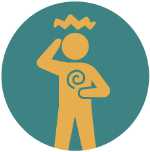Acupuncture: Beyond Pain Relief
When most people hear the word "acupuncture," they think of pain relief. And indeed, acupuncture is well-known for treating back pain, migraines, and joint discomfort. But in Traditional Chinese Medicine (TCM), the scope of acupuncture is far broader. It is a complete medical system used not just to relieve symptoms but to restore balance, prevent disease, and support long-term health.
What to Expect During
an Acupuncture Visit
1. Initial Consultation
Your practitioner will ask about your medical history, sleep, digestion, mood, and overall healthand... not just the symptoms that brought you in.
2. Tongue and Pulse Diagnosis
They may look at your tongue and feel your pulse on both wrists. These help identify patterns of imbalance.
3. Treatment Plan
You’ll lie comfortably on a treatment table, fully clothed except for areas where needles are placed—often arms, legs, back, or abdomen.
4. Needle Insertion
Sterile, hair-thin needles are inserted at selected acupuncture points. Most people feel little or no discomfort.
5. Relaxation Time
Needles stay in for 20–30 minutes. You may feel a warming, tingling, or heavy sensation as qi begins to move.
6. Post-Treatment
You might feel deeply relaxed, refreshed, or occasionally tired after your session. Effects often build with consistent treatment.
At the heart of acupuncture is the concept of qi (气)—vital energy that flows through pathways called meridians. Illness occurs when qi is blocked, deficient, or out of balance. By inserting very fine needles at precise points along these meridians, a trained practitioner can influence the flow of qi to help the body return to a state of harmony. This isn't guesswork; the selection of points follows a diagnostic process rooted in pattern differentiation. Two people with headaches might receive completely different treatments based on their overall condition.
Modern research continues to investigate how acupuncture works. Some theories focus on its ability to stimulate nerves, modulate brain chemistry, and regulate the autonomic nervous system. Clinical trials have shown promising results in treating insomnia, menopausal symptoms, digestive disorders, anxiety, and immune dysfunction. Acupuncture also plays a supportive role in cancer care, reducing side effects like nausea, neuropathy, and fatigue associated with chemotherapy and radiation.
Beyond physical symptoms, acupuncture is often used to stabilize mood, reduce stress, and improve sleep. It treats the person as a whole, not a set of isolated problems. For example, a patient with digestive discomfort and irritability may receive points that address both the Spleen and Liver systems, which are viewed in TCM as energetically interrelated. With regular sessions, acupuncture may help retrain the body's regulatory systems to maintain balance naturally.
One of the reasons acupuncture continues to gain popularity in the West is its low side-effect profile and compatibility with other forms of treatment. It is not meant to replace conventional care but to complement it... enhancing outcomes, especially for chronic or stress-related conditions. When administered by a qualified practitioner, acupuncture is safe, personalized, and rooted in a tradition that spans over 2,000 years.
As our understanding of health continues to evolve, acupuncture reminds us that healing is not just about targeting disease, but nurturing resilience and balance from within.
Vocabulary Guide:
- Qi (气): Vital energy that circulates through the body's meridians
- Meridian: Pathway through which qi flows in the body; associated with organ systems
- Pattern differentiation: Diagnostic method in TCM to determine underlying causes of illness
- Spleen system: In TCM, associated with digestion, energy, and mental focus (not just the physical spleen)
- Liver system: In TCM, governs smooth flow of qi and is tied to emotional regulation and detoxification.





